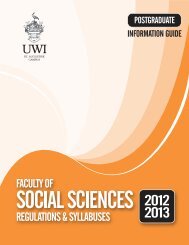Faculty of Humanities and Education (Postgraduate) - The University ...
Faculty of Humanities and Education (Postgraduate) - The University ...
Faculty of Humanities and Education (Postgraduate) - The University ...
You also want an ePaper? Increase the reach of your titles
YUMPU automatically turns print PDFs into web optimized ePapers that Google loves.
40<br />
POSTGRADUATE REGULATIONS & SYLLABUSES 2012 - 2013<br />
THE FACULTY OF HUMANITIES & EDUCATION<br />
YEAR: II<br />
SEMESTER: II<br />
COURSE CODE: LITS 6201<br />
COURSE TITLE: WOMEN’S WRITING AND FEMINIST<br />
THEORIES<br />
NUMBER OF CREDITS: 4<br />
COURSE DESCRIPTION: This course examines a selection <strong>of</strong><br />
woman-authored texts across a range <strong>of</strong> historical periods,<br />
ethnic, backgrounds <strong>and</strong> geo-political locations. This cross<br />
cultural approach seeks to facilitate the exploration <strong>of</strong> common<br />
or global concerns with the equality <strong>and</strong> the social status <strong>of</strong><br />
women. It also pays attention to the specificities <strong>of</strong> experiences<br />
<strong>and</strong> histories that impact gender <strong>and</strong> sexuality politics, thereby<br />
challenging notions <strong>of</strong> a homogeneous category called<br />
“woman”. Literary strategies employed by women to tell their<br />
stories <strong>and</strong> those <strong>of</strong> their communities are brought into focus.<br />
<strong>The</strong> course will trace the key developments in thinking about<br />
gender <strong>and</strong> sexuality from its modern foundations to current<br />
positions <strong>of</strong>fered by transnational feminism, post-colonial <strong>and</strong><br />
postmodern feminist theory.<br />
ASSESSMENT:<br />
Oral Presentations: 30%<br />
<strong>The</strong>oretical response paper (10 pages) 20%<br />
Research Paper (15-20pages) 50%<br />
YEAR: II<br />
SEMESTER: II<br />
COURSE CODE: LITS 6922 (NOT OFFERED 2012/2013)<br />
COURSE TITLE: INTERSECTING FORMS:<br />
LITERATURE AND FILM<br />
NUMBER OF CREDITS: 4<br />
CONTACT HOURS: 3 HOURS PER WEEK, PLUS SCREENING<br />
TIME<br />
PREREQUISITIES: LITS 6007 OR EQUIVALENT GRADUATE<br />
COURSE<br />
COURSE DESCRIPTION: This course has been structured around<br />
the idea that film has shaped modern literary discourse, texts,<br />
drama <strong>and</strong> painting in very fundamental ways. <strong>The</strong> course thus<br />
interrogates the potency <strong>of</strong> film forms, language <strong>and</strong> technique<br />
in literature in particular. It focuses on film’s capacity to mirror<br />
Interior <strong>and</strong> exterior reality, as well as film’s capacity to create<br />
vehicles <strong>of</strong> affect <strong>and</strong> the seductive nature <strong>of</strong> such imaging. It<br />
is designed to provide students in different disciplines with the<br />
tools to conduct critical analyses <strong>of</strong> the processes through which<br />
cinema manipulates <strong>and</strong> shapes human senses <strong>and</strong> perceptions<br />
<strong>and</strong> thus shapes artistic responses. Students are also introduced<br />
to critical discourses that have been constructed around the<br />
idea <strong>of</strong> film <strong>and</strong> its effect on society. Students will also enhance<br />
their underst<strong>and</strong>ing <strong>of</strong> film as being itself a vehicle for ideas <strong>and</strong><br />
debate. Graduate students will benefit from an underst<strong>and</strong>ing <strong>of</strong><br />
how film works, as film is studied within the context <strong>of</strong> advanced<br />
reading <strong>of</strong> contemporary cultural <strong>and</strong> critical theories.<br />
RATIONALE:<br />
<strong>The</strong> course has as a basic requirement that students would<br />
have passed the relevant theoretical courses <strong>of</strong>fered in the<br />
disciplines <strong>of</strong> catchment population, including but not limited<br />
to Literatures in English, Cultural Studies <strong>and</strong> Gender Studies.<br />
It has been designed to help students to underst<strong>and</strong> at an<br />
analytical level the ways in which film form <strong>and</strong> literary form<br />
intersect within contemporary literature. It goes beyond this<br />
to analyse the ways in which the film sense manifests itself in<br />
the other arts. Thus students will come to underst<strong>and</strong> the ways<br />
in which film form <strong>and</strong> language help to shape the discourses<br />
<strong>of</strong> literature <strong>and</strong> gender. <strong>The</strong> course will thus provide a basis<br />
for interdisciplinary work in these areas. Knowledge will be<br />
acquired within a cultural <strong>and</strong> critical framework that will<br />
promote advanced analytical thinking <strong>and</strong> research.<br />
PURPOSE<br />
<strong>The</strong> course is intended to:<br />
• help students develop a clear underst<strong>and</strong>ing <strong>of</strong> how film<br />
works in terms <strong>of</strong> both cognitive <strong>and</strong> epistemological<br />
perceptions in particular where filmic form is<br />
incorporated into literature;<br />
• enable students to apply cultural <strong>and</strong> ideological<br />
frameworks to the analysis <strong>of</strong> the perceptual processes<br />
involved in film narrative <strong>and</strong> literature; <strong>and</strong><br />
• enable students to engage in informed, critical thinking<br />
on literature <strong>and</strong> its intersection with film <strong>and</strong> other art<br />
forms <strong>and</strong> cultural practices.<br />
OBJECTIVES<br />
By the end <strong>of</strong> this course, students will be able to:<br />
• apply theories <strong>of</strong> perception that are informed by<br />
psychological <strong>and</strong> phenomenological perspectives;<br />
• analyse the vehicles through which film achieves<br />
psychological <strong>and</strong> emotional effects;<br />
• analyse the ideological underpinnings <strong>of</strong> film <strong>and</strong> literature,<br />
deploying Cultural <strong>and</strong> Critical theoretical perspectives.<br />
• develop theoretical frameworks to assess cinema <strong>and</strong><br />
cinematic form in literature <strong>and</strong> the visual arts <strong>and</strong>, in<br />
particular, Caribbean literature.<br />
CONTENT<br />
• <strong>The</strong>ories <strong>of</strong> perception (sound <strong>and</strong> visual perception;<br />
perception as a movement to consciousness)<br />
• Debates about the image<br />
• <strong>The</strong>ories <strong>of</strong> narration<br />
• Point <strong>of</strong> view in literature <strong>and</strong> film: intersections.<br />
• Sound-imagerelationsaspurveyors<strong>of</strong>ideologyinliterature<br />
<strong>and</strong> film<br />
TEACHING/LEARNING STRATEGIES<br />
• Lectures<br />
• Screenings <strong>and</strong> discussions;<br />
• Projects

















